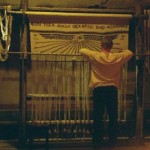 Just as how the Others blindly follow Jacob, we Lost fans have invested five years of our lives blindly following a TV show that has become increasingly intricate. Will our commitment be worth it in the end? Those of us who have faith have stuck with it, but we’ve lost a lot of former believers along the way. What if the series finale is a disappointment and leaves many of the major questions unanswered? Will we question our blind faith in a show that we hoped would give us answers to its convoluted storyline, and beyond? Hopefully we won’t get to that point, but I have some thoughts just in case we do.
Just as how the Others blindly follow Jacob, we Lost fans have invested five years of our lives blindly following a TV show that has become increasingly intricate. Will our commitment be worth it in the end? Those of us who have faith have stuck with it, but we’ve lost a lot of former believers along the way. What if the series finale is a disappointment and leaves many of the major questions unanswered? Will we question our blind faith in a show that we hoped would give us answers to its convoluted storyline, and beyond? Hopefully we won’t get to that point, but I have some thoughts just in case we do.
 The concept of taking a leap of faith has been covered many times on Lost. Locke had told Jack that he was taking a leap of faith by pressing the button; Hurley took a leap of faith by risking his life with Charlie to get the DHARMA van started as it sped down a hill; and in the episode titled, “316,” the theme shows up throughout. In fact, the title itself should’ve been the first tip-off.
The concept of taking a leap of faith has been covered many times on Lost. Locke had told Jack that he was taking a leap of faith by pressing the button; Hurley took a leap of faith by risking his life with Charlie to get the DHARMA van started as it sped down a hill; and in the episode titled, “316,” the theme shows up throughout. In fact, the title itself should’ve been the first tip-off.
 While most mythological stories explore at least one or two truths about the way our world works, Lost is unique in that it explores hundreds of them. It’s almost as if Lost is a spiritual guidebook to life. While I sometimes joke around about it, I’m beginning to truly believe that fans of the show will be better equipped to handle the strange new world we are going to inherit in the upcoming years. Whether consciously or subconsciously, it is almost as if Lost is training us to be able to mentally handle the future. The Good Book says that the meek shall inherit the earth. Perhaps it was referring to Lost geeks.
While most mythological stories explore at least one or two truths about the way our world works, Lost is unique in that it explores hundreds of them. It’s almost as if Lost is a spiritual guidebook to life. While I sometimes joke around about it, I’m beginning to truly believe that fans of the show will be better equipped to handle the strange new world we are going to inherit in the upcoming years. Whether consciously or subconsciously, it is almost as if Lost is training us to be able to mentally handle the future. The Good Book says that the meek shall inherit the earth. Perhaps it was referring to Lost geeks.
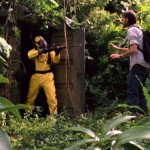 There seems to be a pattern that determines when Locke and the gang are jumping in time on Lost. Whether it’s Richard Alpert telling Locke what to do when he next sees him, or Faraday telling Desmond to find his mother in the future, or Locke telling Alpert to seek him out in a few years once he’s born. So far, the jumps occur whenever a character is talking to another character about events from a different time. Perhaps fate is preventing the characters from knowing something they shouldn’t be privy too or maybe it’s time’s way of course correcting, but I believe there is a deeper reason why the time jumps are happening at that exact moment. And it relates to wisdom we can use in our real lives.
There seems to be a pattern that determines when Locke and the gang are jumping in time on Lost. Whether it’s Richard Alpert telling Locke what to do when he next sees him, or Faraday telling Desmond to find his mother in the future, or Locke telling Alpert to seek him out in a few years once he’s born. So far, the jumps occur whenever a character is talking to another character about events from a different time. Perhaps fate is preventing the characters from knowing something they shouldn’t be privy too or maybe it’s time’s way of course correcting, but I believe there is a deeper reason why the time jumps are happening at that exact moment. And it relates to wisdom we can use in our real lives.
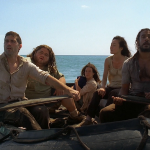 Continuing in the same vein as Part 1, Parts 2&3 was mostly action/adventure and little mythology. And what little there was still seems to support my theory.
Continuing in the same vein as Part 1, Parts 2&3 was mostly action/adventure and little mythology. And what little there was still seems to support my theory.
For starters, at the end of the last episode’s update, I wrote:
In “Something Nice Back Home” Hurley even suggests that none of them made it off the island, and they were, perhaps dead. Not dead, just stuck in limbo between worlds. I feel like the season will end with the five of them not being rescued as we think, but getting hurt, and this whole flash-forward has all been in their minds.
 This episode had a really good mix of suspense and mystery, closer to Seasons 1 & 2 Lost. Early on in the episode, we get a flash-forward of Jack where he goes to visit Hurley in the Santa Rosa Mental Hospital. Hurley hasn’t been taken his meds because he believes that he and the other Oceanic Six are all dead and that none of them actually made it off the island. Hurley asks Jack about his day and Jack tells him of his life now with Kate and Aaron. Hurley compares Jack’s life with Kate to heaven. Hurley then mentions that he still sees Charlie and talks to him and Charlie had a message for Jack: that he’s “not supposed to raise him,” apparently referring to Aaron. Hurley then tells Jack that he would also be getting a visit from someone soon. That person winds up being Jack’s father, who Jack sees clearly sitting on the couch at the hospital where he works. So are Charlie and Jack’s father still alive? The simulation theory presented in “The Myth of Lost” predicted that they were, but not in the ghostly way that they’ve been appearing on the show.
This episode had a really good mix of suspense and mystery, closer to Seasons 1 & 2 Lost. Early on in the episode, we get a flash-forward of Jack where he goes to visit Hurley in the Santa Rosa Mental Hospital. Hurley hasn’t been taken his meds because he believes that he and the other Oceanic Six are all dead and that none of them actually made it off the island. Hurley asks Jack about his day and Jack tells him of his life now with Kate and Aaron. Hurley compares Jack’s life with Kate to heaven. Hurley then mentions that he still sees Charlie and talks to him and Charlie had a message for Jack: that he’s “not supposed to raise him,” apparently referring to Aaron. Hurley then tells Jack that he would also be getting a visit from someone soon. That person winds up being Jack’s father, who Jack sees clearly sitting on the couch at the hospital where he works. So are Charlie and Jack’s father still alive? The simulation theory presented in “The Myth of Lost” predicted that they were, but not in the ghostly way that they’ve been appearing on the show.
 This is the first episode written after the writer’s strike, and to me, it felt like it. The story was rushed, the dialogue seemed out of place for the characters (i.e., Sawyer telling Ben that he’d kill him if he harmed on hair on Hurley’s head—since when does Sawyer care that much about anyone but himself?), and the action was kind of unbelievable at times (Sayid turning his head all the way around to notice Ben photographing him from atop a building behind him). In spite of this, or perhaps because of it, I also found this episode pretty funny.
This is the first episode written after the writer’s strike, and to me, it felt like it. The story was rushed, the dialogue seemed out of place for the characters (i.e., Sawyer telling Ben that he’d kill him if he harmed on hair on Hurley’s head—since when does Sawyer care that much about anyone but himself?), and the action was kind of unbelievable at times (Sayid turning his head all the way around to notice Ben photographing him from atop a building behind him). In spite of this, or perhaps because of it, I also found this episode pretty funny.
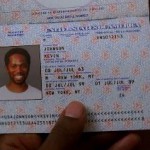 The first thing that stuck me as interesting in this episode was Michael, a.k.a., Kevin Johnson, responding to Sayid’s question about what he was doing there by saying that he was there to die. After watching the full episode, we may assume that he was referring to his repeated attempts at suicide, but if “The Myth of Lost” simulation theory is correct, Michael may be talking about something else—his desire to die and get out of the simulation already.
The first thing that stuck me as interesting in this episode was Michael, a.k.a., Kevin Johnson, responding to Sayid’s question about what he was doing there by saying that he was there to die. After watching the full episode, we may assume that he was referring to his repeated attempts at suicide, but if “The Myth of Lost” simulation theory is correct, Michael may be talking about something else—his desire to die and get out of the simulation already.
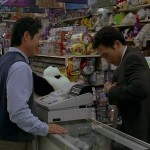 If nothing else, this episode certainly proved that the writers are still at the top of their game, using creative use of flashbacks and flash-forwards to offer an intriguing twist. I also think it gave a lot of weight to “The Myth of Lost” simulation theory, and some of the sub-theories related to it.
If nothing else, this episode certainly proved that the writers are still at the top of their game, using creative use of flashbacks and flash-forwards to offer an intriguing twist. I also think it gave a lot of weight to “The Myth of Lost” simulation theory, and some of the sub-theories related to it.
 The episode begins within the flashback of “Other” woman Juliet where she meets fellow Other, Harper Stanhope. We learn that Harper is a psychologist to the Others and married to Goodwin, who Juliet later has an affair with, making her the other woman from Harper’s perspective. Of course, the other woman may also be Harper herself from Juliet’s perspective. Either way, the fact that Harper is a psychologist definitely fits in with The Myth of Lost simulation theory because of one of its major points: that many of the Others are providing therapy to the Losties. If this were true, just as in our world, therapists see their own therapists regularly. So, having a resident shrink on the island is a big boost to the simulation theory.
The episode begins within the flashback of “Other” woman Juliet where she meets fellow Other, Harper Stanhope. We learn that Harper is a psychologist to the Others and married to Goodwin, who Juliet later has an affair with, making her the other woman from Harper’s perspective. Of course, the other woman may also be Harper herself from Juliet’s perspective. Either way, the fact that Harper is a psychologist definitely fits in with The Myth of Lost simulation theory because of one of its major points: that many of the Others are providing therapy to the Losties. If this were true, just as in our world, therapists see their own therapists regularly. So, having a resident shrink on the island is a big boost to the simulation theory.
 Just as how the Others blindly follow Jacob, we Lost fans have invested five years of our lives blindly following a TV show that has become increasingly intricate. Will our commitment be worth it in the end? Those of us who have faith have stuck with it, but we’ve lost a lot of former believers along the way. What if the series finale is a disappointment and leaves many of the major questions unanswered? Will we question our blind faith in a show that we hoped would give us answers to its convoluted storyline, and beyond? Hopefully we won’t get to that point, but I have some thoughts just in case we do.
Just as how the Others blindly follow Jacob, we Lost fans have invested five years of our lives blindly following a TV show that has become increasingly intricate. Will our commitment be worth it in the end? Those of us who have faith have stuck with it, but we’ve lost a lot of former believers along the way. What if the series finale is a disappointment and leaves many of the major questions unanswered? Will we question our blind faith in a show that we hoped would give us answers to its convoluted storyline, and beyond? Hopefully we won’t get to that point, but I have some thoughts just in case we do. The concept of taking a leap of faith has been covered many times on Lost. Locke had told Jack that he was taking a leap of faith by pressing the button; Hurley took a leap of faith by risking his life with Charlie to get the DHARMA van started as it sped down a hill; and in the episode titled, “316,” the theme shows up throughout. In fact, the title itself should’ve been the first tip-off.
The concept of taking a leap of faith has been covered many times on Lost. Locke had told Jack that he was taking a leap of faith by pressing the button; Hurley took a leap of faith by risking his life with Charlie to get the DHARMA van started as it sped down a hill; and in the episode titled, “316,” the theme shows up throughout. In fact, the title itself should’ve been the first tip-off. While most mythological stories explore at least one or two truths about the way our world works, Lost is unique in that it explores hundreds of them. It’s almost as if Lost is a spiritual guidebook to life. While I sometimes joke around about it, I’m beginning to truly believe that fans of the show will be better equipped to handle the strange new world we are going to inherit in the upcoming years. Whether consciously or subconsciously, it is almost as if Lost is training us to be able to mentally handle the future. The Good Book says that the meek shall inherit the earth. Perhaps it was referring to Lost geeks.
While most mythological stories explore at least one or two truths about the way our world works, Lost is unique in that it explores hundreds of them. It’s almost as if Lost is a spiritual guidebook to life. While I sometimes joke around about it, I’m beginning to truly believe that fans of the show will be better equipped to handle the strange new world we are going to inherit in the upcoming years. Whether consciously or subconsciously, it is almost as if Lost is training us to be able to mentally handle the future. The Good Book says that the meek shall inherit the earth. Perhaps it was referring to Lost geeks. There seems to be a pattern that determines when Locke and the gang are jumping in time on Lost. Whether it’s Richard Alpert telling Locke what to do when he next sees him, or Faraday telling Desmond to find his mother in the future, or Locke telling Alpert to seek him out in a few years once he’s born. So far, the jumps occur whenever a character is talking to another character about events from a different time. Perhaps fate is preventing the characters from knowing something they shouldn’t be privy too or maybe it’s time’s way of course correcting, but I believe there is a deeper reason why the time jumps are happening at that exact moment. And it relates to wisdom we can use in our real lives.
There seems to be a pattern that determines when Locke and the gang are jumping in time on Lost. Whether it’s Richard Alpert telling Locke what to do when he next sees him, or Faraday telling Desmond to find his mother in the future, or Locke telling Alpert to seek him out in a few years once he’s born. So far, the jumps occur whenever a character is talking to another character about events from a different time. Perhaps fate is preventing the characters from knowing something they shouldn’t be privy too or maybe it’s time’s way of course correcting, but I believe there is a deeper reason why the time jumps are happening at that exact moment. And it relates to wisdom we can use in our real lives.






